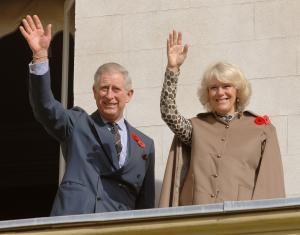Correspondence between Prince Charles and government ministers dating back to 2004 and 2005 has been released for public viewing after a 10 year legal battle. The text of the 27 letters include the exchange of opinions on subjects including illegal fishing, school dinners and the preservation of the Smithfield Market buildings.
The letters, known as the ‘black spider memos’ thanks to Prince Charles’s notoriously scrawled handwriting, have been the subject of lengthy legal proceedings ever since 2005, when the government first received applications to view them.
The government refused under Freedom of Information exemptions covering communications with the Queen and her heirs to the government, on the grounds that the two parties ought to be able to converse on governmental matters privately.
A statement released by the Cabinet Office today said that “the government maintains that communications between the Heir to The Throne and ministers should remain private, and that this is a part of our constitutional arrangements.”
During proceedings, the Information Commissioner agreed with the government but was overturned by the Information Tribunal which ordered the release of the documents. Then in 2012 the Attorney General issued a veto under the FOI act, but in March the Supreme Court overturned that veto, leading to the publication of the letters on the Cabinet Office’s website today.
Despite their moniker the letters are in fact mostly typed. They include letters to the Prince from various ministers, as well as his Royal Highness’s replies, which illustrate the influence, and occasionally lack of influence the Prince has on governmental matters. They also allude to his Christian faith.
A typical exchange is found between Tessa Jowell, then Culture Secretary, who wrote to the Prince on the 28th February 2005 to inform him that, following Prince Charles’s “expressing support for the listing of the General Market and Annexe Buildings at Smithfield Market”, she had “decided to list, at Grade II, the Red House cold store”.
She added “I share your concern about the fate of these buildings [including the General Market and annexes] and consider that they … provide an important contribution to the character of this historic area”.
On the 27th March of that year the Prince thanked her for her letter, saying “Needless to say, I was extremely glad to read of your appreciation of the value of this group of buildings. As you know, I attach the greatest importance to preserving, restoring and re-using such precious heritage townscapes and I can only pray that the Deputy Prime Minister will take your advice and give the most careful consideration to development plans.”
In another dated 30th September 2004, Elliot Morley, an environment minister who was later jailed in the expenses scandal wrote to the Prince to inform about the work of the High Seas Task Force and its role in tackling illegal fishing. The Prince replied on the 21st October, thanking Mr Morley for the letter.
“I must say that it is enormously encouraging to know of your efforts to try and bring to heel the recalcitrant countries who sanction, either directly or by turning a blind eye, pirate and illegal fishing and I do wish you well in your endeavours,” he wrote, before asking whether the Royal Navy might have a role to play.
“I am probably being very ignorant about all of this, so please forgive me, but is the Royal Navy, for instance, included in the discussions for this issue?” he asked.
Commenting on the letters’ release, a spokesman from Clarence House, the Prince’s official residence, said “The correspondence published by the Government today shows the range of The Prince of Wales’ concerns and interests for this country and the wider world.
“The Prince of Wales cares deeply about this country, and tries to use his unique position to help others. He has devoted most of his working life to helping individuals and organisations, to make a difference for the better of this country and the world.
“The letters published by the Government show The Prince of Wales expressing concern about issues that he has raised in public like the state of farming, the preservation and regeneration of historic buildings, the re-use of disused hospital buildings, the professional development of schoolteachers, and others. In all these cases, The Prince of Wales is raising issues of public concern, and trying to find practical ways to address the issues.
“The Prince of Wales believes, as have successive Governments, that he should have a right to communicate privately. The publication of private letters can only inhibit his ability to express the concerns and suggestions which have been put to him in the course of his travels and meetings.
“Clarence House continues to believe in the principle of privacy.”

COMMENTS
Please let us know if you're having issues with commenting.